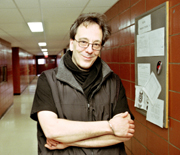
Van Wyck mused about the
FTAA summit in April: "I can't figure out whether one would get
a better seat remotely or on the site."
Photo by Andrew Dobrowolskyj
|
by Debbie Hum
Virtually everybody has something to say about the process of globalization.
Many, especially students, are planning to protest the Summit of the Americas
in Quebec City in April. Everyone is primed to watch a lot of people get
arrested.
To Peter van Wyck, Assistant Professor of Communication Studies, these
features of the so-called anti-globalization movement are not entirely
remarkable given our age-old history of civil disobedience and riots,
and events throughout the 20th century.
“Protests around globalization issues are no more confrontational
than protests in the past. That’s a convenient myth,” van Wyck
said. “A perception has been built up of confrontational youth, but
if there’s any truth to it whatsoever, I don’t see any evidence
of it.”
Students have been a huge social force for many decades, van Wyck noted.
He likes to think that the large representation of students at these protests
has something to do with their being in school.
“It’s an enabling environment in which students are exposed
to new ideas and discover that one can have a voice,” he said. While
there isn’t a singular unifying cause among the students, “they’re
there to take part in a public forum, in an attempt to say, ‘We’re
watching, we don’t like what’s going on, and we don’t like
being excluded from any sense of a democractic process and of discussion
around it.’”
According to van Wyck, the last 25 years have seen a kind of “radical
unmooring” of global capital development from the confines of the
nation-state.
There is a prevailing sense that the nation is no longer the forum for
democratic discourse, that corporate institutions have crept in in the
middle of the night and hijacked the possibility for that sort of discourse
to take place, he said. People are beginning to contest the practices
and dimensions of globalization that they see as a move away from civil
society.
One characteristic of the globalization phenomenon, van Wyck observed,
is the spontaneous affinity that is built between unlikely comrades with
apparently incompatible agendas.
This is not surprising to him, either.
“The apparently monolithic nature of what we’re up against is
significant enough that it’s making a lot of people overlook a lot
of very real political differences,” Van Wyck said. “It’s
convenient, practical and prudent to co-operate. It really is an exercise
in politics and political discourse.”
The list of constituencies expected to show up uninvited in Quebec is
extensive and inclusive — anybody who has anything to do with social
justice, humanitarian, ecological, cultural, economic, employment and
empowerment issues.
However, van Wyck stressed that the clashes we will witness between protesters
and security forces in Quebec are simply the visual front-end of the movement,
the bites that look and sound good. Many other people will be trying to
set up a counter-discourse against the talks going on behind closed doors,
mainly non-governmental organizations who have articulated protests on
the global stage since the late 1960s and early 70s.
“In a way, the rise of the non-governmental organizations has been
cushioning part of the shock of economic development and the development
philosophy that has been largely responsible for increases or decreases
in welfare of living for most of the world,” he said.
Certainly, he added, the media has been complicit in a massive simplification
of what globalization really means and what’s actually going on.
Do we mean corporate globalization, cultural globalization, information
globalization, or globalization of the civil society?
“We need to be far more specific about what it is we’re talking
about,” said van Wyck. “Obviously, there are a lot of interesting
possibilities that are presented by a world that is understood globally,
and not all of them are bad.”
Van Wyck, a forester who turned activist-academic following “a series
of disenchantments,” has studied the discourses of radical environmentalism,
its philosophical framework and the troubling aspects of how environmentalism
is being construed. He has a PhD from McGill, and joined Concordia last
fall.
This is part of a series of articles about the issue of globalization
from the perspectives of Concordia professors and students.
|
|
|



